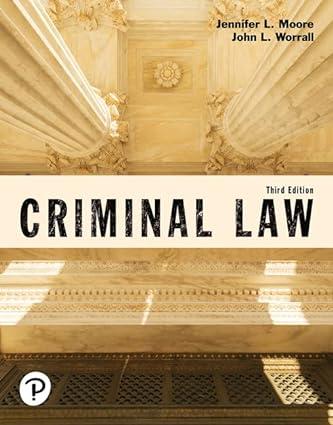Johnson was convicted in the County Criminal Court No. 8, Dallas County for desecration of a venerated
Question:
Johnson was convicted in the County Criminal Court No. 8, Dallas County for desecration of a venerated object and he appealed. The Dallas Court of Appeals affirmed the conviction. The Texas Court of Criminal Appeals reversed and remanded and the Supreme Court granted certiorari.
After publicly burning an American flag as a means of political protest, Gregory Lee Johnson was convicted of desecrating a flag in violation of Texas law. This case presents the question whether his conviction is consistent with the First Amendment. We hold that it is not.
While the Republican National Convention was taking place in Dallas in 1984, respondent Johnson participated in a political demonstration dubbed the “Republican War Chest Tour” . . . The demonstrators marched through the Dallas streets, chanting political slogans and stopping at several corporate locations to stage “die-ins” intended to dramatize the consequences of nuclear war. On several occasions they spray-painted the walls of buildings and overturned potted plants, but Johnson himself took no part in such activities. He did, however, accept an American flag handed to him by a fellow protestor who had taken it from a flagpole outside one of the targeted buildings.
The demonstration ended in front of Dallas City Hall, where Johnson unfurled the American flag, doused it with kerosene, and set it on fire. While the flag burned, the protestors chanted: “America, the red, white, and blue, we spit on you” . . . Of the approximately 100 demonstrators, Johnson alone was charged with a crime. The only criminal offense with which he was charged was the desecration of a venerated object in violation of Tex.Penal Code Ann.
§ 42.09(a)(3) (1959). After a trial, he was convicted, sentenced to one year in prison, and fined $2,000. The Court of Appeals for the Fifth District of Texas at Dallas affirmed Johnson’s conviction, but the Texas Court of Criminal Appeals reversed, holding that the State could not, consistent with the First Amendment, punish Johnson for burning the flag in these circumstances.
. . . We must first determine whether Johnson’s burning of the flag constituted expressive conduct, permitting him to invoke the First Amendment in challenging his conviction. If his conduct was expressive, we next decide whether the State’s regulation is related to the suppression of free expression . . .
The First Amendment literally forbids the abridgment only of “speech,” but we have long recognized that its protection does not end at the spoken or written word. While we have rejected “the view that an apparently limitless variety of conduct can be labeled ‘speech’ whenever the person engaging in the conduct intends thereby to express an idea,” we have acknowledged that conduct may be “sufficiently imbued with elements of communication to fall within the scope of the First and Fourteenth Amendments.”
Johnson burned an American flag as part—indeed, as the culmination—of a political demonstration that coincided with the convening of the Republican Party and its re-nomination of Ronald Reagan for President. The expressive, overtly political nature of this conduct was both intentional and overwhelmingly apparent . . . In these circumstances, Johnson’s burning of the flag was conduct “sufficiently imbued with elements of communication,” to implicate the First Amendment.
. . . If there is a bedrock principle underlying the First Amendment, it is that the government may not prohibit the expression of an idea simply because society finds the idea itself offensive or disagreeable . . . Johnson was convicted for engaging in expressive conduct. The State’s interest in preventing breaches of the peace does not support his conviction because Johnson’s conduct did not threaten to disturb the peace. Nor does the State’s interest in preserving the flag as a symbol of nationhood and national unity justify his criminal conviction for engaging in political expression. The judgment of the Texas Court of Criminal Appeals is therefore Affirmed.
Justice STEVENS, dissenting As the Court analyzes this case, it presents the question whether the State of Texas, or indeed the Federal Government, has the power to prohibit the public desecration of the American flag. The question is unique. In my judgment rules that apply to a host of other symbols, such as state flags, armbands, or various privately promoted emblems of political or commercial identity, are not necessarily controlling. Even if flag burning could be considered just another species of symbolic speech under the logical application of the rules that the Court has developed in its interpretation of the First Amendment in other contexts, this case has an intangible dimension that makes those rules inapplicable.
. . . The value of the flag as a symbol cannot be measured. Even so, I have no doubt that the interest in preserving that value for the future is both significant and legitimate. Conceivably that value will be enhanced by the Court’s conclusion that our national commitment to free expression is so strong that even the United States as ultimate guarantor of that freedom is without power to prohibit the desecration of its unique symbol. But I am unpersuaded. The creation of a federal right to post bulletin boards and graffiti on the Washington Monument might enlarge the market for free expression, but at a cost I would not pay. Similarly, in my considered judgment, sanctioning the public desecration of the flag will tarnish its value—both for those who cherish the ideas for which it waves and for those who desire to don the robes of martyrdom by burning it.
Questions:-
1. What crime was Johnson charged with?
2. Explain how “conduct” can be considered speech under the First Amendment?
3. What happened to the Texas Criminal Statute after the Supreme Court issued its decision?
4. What was Justice Steven’s primary argument in his dissent?
Step by Step Answer:






